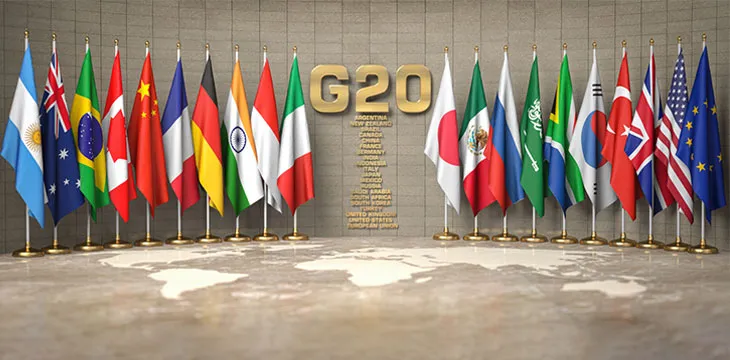|
Getting your Trinity Audio player ready...
|
India’s Finance Minister Nirmala Sitharaman has confirmed that the G20 has begun exploring the possibilities of a global legal framework for digital currencies.
Speaking with central bank directors in New Delhi, Sitharaman underscored the importance of the move given the novelty of digital assets and the “sophisticated technologies” underlying it. Sitharaman pointed to the scale of implosions faced by centralized entities in the virtual currency ecosystem and the losses suffered by investors in their wake.
“We are talking to all nations, that if it requires regulation, then one country alone cannot do anything,” she said. “We are talking with all nations, if we can make some standard operating procedure which everyone follows to make a regulatory framework, and if it can be effective.”
Sitharaman noted that India would be leading the discussions of a potential global framework for virtual assets given its role as president of the G20 nations, a role it has occupied since December 2022. India has stated that achieving a global consensus on virtual currencies is a core part of its objectives as G20 president to prevent “regulatory arbitrage.”
India has already begun laying the pieces of the grand puzzle together with a planned meeting between the G20 finance ministers and its central bank governors in late February. Top of the agenda for participants will be the prevention of the “cryptoization” of their local economies, stablecoin regulation, taxing digital assets, and the role of central bank digital currencies (CBDC).
Virtual currency legislation in the G20 countries has proceeded with a staccato approach as member nations have each attempted various systems of control. Experts claimed that by the end of India’s tenure as G20 president, there would be a consensus on whether or not to view digital assets as securities or commodities.
Predicting a regime of draconian rules for digital assets
India’s stance on virtual assets has traditionally been hard, with the country’s central bank infamously describing them as a “Ponzi scheme” capable of triggering financial chaos.
Back in 2017, the Reserve Bank of India (RBI) issued a directive precluding banks and other financial institutions from facilitating digital currency transactions, but the order was overruled by the Supreme Court.
A stringent tax policy on virtual assets and the refusal to budge despite multiple pleas from stakeholders in India’s local digital currency ecosystem hints that India will push tight controls among G20 nations. Indians are expected to pay a 30% tax on digital asset gains and an additional 1% TDS on all transactions without the ability to offset losses.
Watch: New Technologies, New Futures for Nations

 07-02-2025
07-02-2025 





